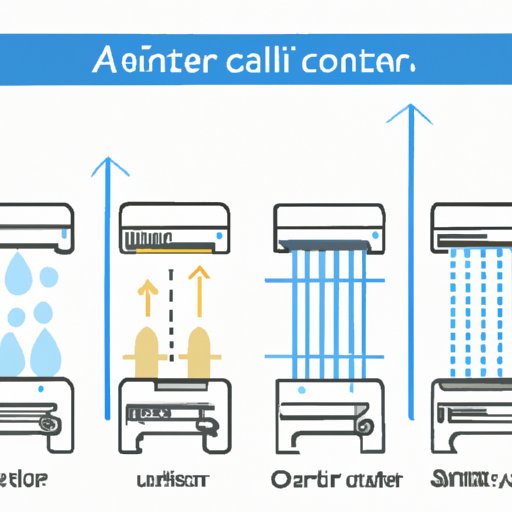Introduction
An air conditioner is a device used to cool the air in indoor spaces. It works by circulating cooled air through the room, which lowers the temperature and removes humidity from the air. The invention of the air conditioner has had a profound effect on modern living and ushered in a new era of comfort and convenience.
But who invented the air conditioner and what innovations enabled its development? This article will explore the history, science, and impact of the air conditioner, as well as the fascinating story of the inventors behind it.
Historical Account of the Invention of the Air Conditioner
The concept of air conditioning dates back to ancient times. Ancient Egyptians used evaporation to cool their homes, while the Chinese used water-filled vessels to absorb heat from the air. However, these methods were not effective at cooling large areas or controlling the humidity level.
The first successful attempt at air conditioning was made by American inventor, Dr. John Gorrie, in 1842. He developed a machine that used compressed air to create ice, which he then used to cool the air in his hospital ward. Despite his efforts, the technology was too primitive to be widely adopted.
In the late 19th century, more advanced attempts were made to develop a refrigeration cycle, which would be the basis of modern air conditioning. In 1902, Willis Haviland Carrier created the first modern air conditioning system, which used a compressor and condenser to cool the air. His invention revolutionized the industry and paved the way for modern air conditioners.
The Inventor Behind the Air Conditioner
Willis Haviland Carrier is widely credited with inventing the air conditioner. He was an American engineer who developed the first modern air conditioning system in 1902. His invention was based on the principles of the refrigeration cycle, which he had studied in college.
Carrier’s invention revolutionized the industry and enabled the widespread adoption of air conditioning in homes and businesses. He went on to found the Carrier Corporation, which remains one of the largest manufacturers of air conditioning systems today.
Other notable inventors of the air conditioner include Alfred Wolff, Stuart Cramer, and Thomas Midgley Jr. All of them contributed to the development of the air conditioner and enabled its widespread use.
The Fascinating Story of the Creation of the Air Conditioner
The invention of the air conditioner was no easy feat. Early inventors faced numerous challenges in developing a reliable and efficient cooling system. One of the biggest obstacles they faced was creating a compressor that could withstand the pressures involved in the refrigeration cycle.
Innovations such as the centrifugal compressor and the Freon gas allowed for the development of more efficient and powerful air conditioning systems. These breakthroughs enabled the widespread adoption of air conditioning in homes and businesses.

How the Air Conditioner Changed Modern Living
The invention of the air conditioner has dramatically changed modern living. It has enabled people to live and work comfortably in hot climates and opened up new opportunities for business and industry.
At home, the air conditioner has improved comfort levels and enabled people to enjoy a higher quality of life. Air conditioning also helps to reduce allergens in the air, making it easier to breathe indoors.
In the workplace, air conditioning has enabled businesses to operate in hot climates, which has led to a surge in productivity. It has also enabled companies to build larger, more efficient factories and offices.

A Timeline of the Development of the Air Conditioner
The invention of the air conditioner was a long process, beginning with early attempts at cooling and ending with the development of modern air conditioners. Here is a timeline of the major milestones in the development of the air conditioner:
- 1842 – Dr. John Gorrie creates the first successful air conditioning system.
- 1881 – Alfred Wolff patents his vapor compression refrigeration machine.
- 1902 – Willis Haviland Carrier invents the first modern air conditioning system.
- 1906 – Stuart Cramer invents the centrifugal compressor.
- 1930s – Thomas Midgley Jr. develops Freon, a refrigerant gas.
- 1940s – Air conditioning becomes widely used in homes and businesses.

Exploring the Science Behind the Air Conditioner
The air conditioner works by using a refrigeration cycle to cool the air. The cycle consists of four steps: compression, condensation, expansion, and evaporation. The heat from the air is absorbed by the refrigerant gas, which cools the air as it passes through the evaporator coil.
Heat transfer is also important in understanding how the air conditioner works. Heat is transferred from the air inside the room to the refrigerant gas, which absorbs the heat and carries it outside. This allows the air inside the room to be cooled.
Conclusion
The invention of the air conditioner has had a profound effect on modern living. It has enabled people to live and work comfortably in hot climates and opened up new opportunities for business and industry. The air conditioner has improved comfort levels at home and enabled businesses to operate more efficiently.
The development of the air conditioner was a long process, beginning with early attempts at cooling and ending with the development of modern air conditioners. Innovations such as the centrifugal compressor and the Freon gas allowed for the development of more efficient and powerful air conditioning systems. The principles of the refrigeration cycle and heat transfer are essential to understanding how the air conditioner works.
The story of the invention of the air conditioner is an inspiring one. Despite the many challenges faced by early inventors, they persevered and eventually succeeded in creating a revolutionary invention that changed the world.
(Note: Is this article not meeting your expectations? Do you have knowledge or insights to share? Unlock new opportunities and expand your reach by joining our authors team. Click Registration to join us and share your expertise with our readers.)
